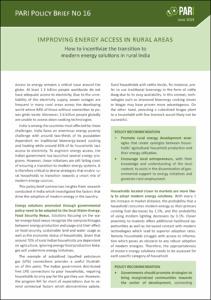Gaur, Varun; Haluska, Nicholas: Improving energy access in rural areas : How to incentivize the transition to modern energy solutions in rural India. Bonn: Center for Development Research (ZEF), 2019. In: PARI Policy Brief, 16.
Online-Ausgabe in bonndoc: https://doi.org/10.48565/bonndoc-55
Online-Ausgabe in bonndoc: https://doi.org/10.48565/bonndoc-55
@techreport{handle:20.500.11811/10135,
doi: https://doi.org/10.48565/bonndoc-55,
author = {{Varun Gaur} and {Nicholas Haluska}},
title = {Improving energy access in rural areas : How to incentivize the transition to modern energy solutions in rural India},
publisher = {Center for Development Research (ZEF)},
year = 2019,
month = jun,
series = {PARI Policy Brief},
volume = 16,
note = {Access to energy remains a critical issue around the globe. At least 1.3 billion people worldwide do not have adequate access to electricity. Due to the unreliability of the electricity supply, power outages are frequent in many rural areas across the developing world where 84% of those without connection to power grids reside. Moreover, 2.6 billion people globally are unable to access clean cooking technologies.
India is among the countries most affected by these challenges. India faces an enormous energy poverty challenge with around two-thirds of its population dependent on traditional bioenergy-based cooking and heating while around 45% of its households lack access to electricity. To augment energy access, the Indian government has launched several energy programs. However, these initiatives are still falling short of ensuring a transition to modern energy systems. It is therefore critical to devise strategies that enable rural households to transition towards a smart mix of modern energy sources.
This policy brief summarizes insights from research conducted in India which investigated the factors that drive the adoption of modern energy in the country.},
url = {https://hdl.handle.net/20.500.11811/10135}
}
doi: https://doi.org/10.48565/bonndoc-55,
author = {{Varun Gaur} and {Nicholas Haluska}},
title = {Improving energy access in rural areas : How to incentivize the transition to modern energy solutions in rural India},
publisher = {Center for Development Research (ZEF)},
year = 2019,
month = jun,
series = {PARI Policy Brief},
volume = 16,
note = {Access to energy remains a critical issue around the globe. At least 1.3 billion people worldwide do not have adequate access to electricity. Due to the unreliability of the electricity supply, power outages are frequent in many rural areas across the developing world where 84% of those without connection to power grids reside. Moreover, 2.6 billion people globally are unable to access clean cooking technologies.
India is among the countries most affected by these challenges. India faces an enormous energy poverty challenge with around two-thirds of its population dependent on traditional bioenergy-based cooking and heating while around 45% of its households lack access to electricity. To augment energy access, the Indian government has launched several energy programs. However, these initiatives are still falling short of ensuring a transition to modern energy systems. It is therefore critical to devise strategies that enable rural households to transition towards a smart mix of modern energy sources.
This policy brief summarizes insights from research conducted in India which investigated the factors that drive the adoption of modern energy in the country.},
url = {https://hdl.handle.net/20.500.11811/10135}
}






